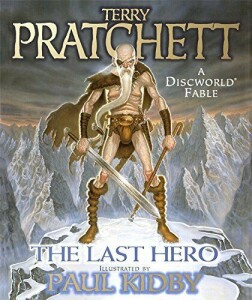 What happens when a hero is really good at what he does? He gets old, like the rest of us. But after he’s outlived his usefulness, he doesn’t know how to be anything but a hero.
What happens when a hero is really good at what he does? He gets old, like the rest of us. But after he’s outlived his usefulness, he doesn’t know how to be anything but a hero.
At least, that’s the story of Cohen the Barbarian, the eponymous hero in this installment of Terry Pratchett’s great Discworld series. This one is special, since it’s illustrated by Paul Kidby, who has previously collaborated with Pratchett on book covers and calendars. It’s a big coffee-table book, loaded with gorgeous paintings of Discworld, drawings, sketches and hilarious renderings of the story’s characters and situations.
It’s billed as a fable, and it fits. As usual with Pratchett’s books, we get a couple of parallel tales going on at the same time, which with any luck will intersect somewhere toward the end.
As with all fables, the characters are bigger than life. Cohen has lived to be a grouchy old fart, bored with the empire he won in a lifetime of heroing and pissed-off at the gods for letting him get old. Half the time, he can’t remember where he left his dentures. So he and his Silver Horde — or what’s left of it — reunite for one last caper. The first hero, Mazda, stole something from the gods: fire. Cohen aims to return it to them, with interest. He and his cronies — Caleb the Ripper, Boy Willie, Truckle the Uncivil and Mad Hamish — are delivering a big bomb to the home of the gods atop Cori Celesti, Discworld’s central mountain. And they’ve kidnapped a bard to ensure their immortality.
Trouble is, if their plan succeeds, it could fatally damage the magic that holds Discworld together as it flies through space on the backs of four huge elephants. So Lord Vetinari, the Patrician of Ankh-Morpork, is urging the wizards to come up with a scheme to stop the heroes. What they devise is a mad quest that combines the best features of Lord of the Rings and Apollo 13.
Pratchett has a sure hand at this sort of thing by now, and he knows when to go for the belly laugh and when the subtle chuckle. And as with the best satirists, from Juvenal right through Swift and Twain and Vonnegut, the foibles of his characters are keen reflections of those we’re likely to find in ourselves and our world.
The Last Hero is an entertaining tale, and Kidby’s illustrations delightful. A must for all true fans, and sure to entice some new ones.
(HarperCollins, 2001)
